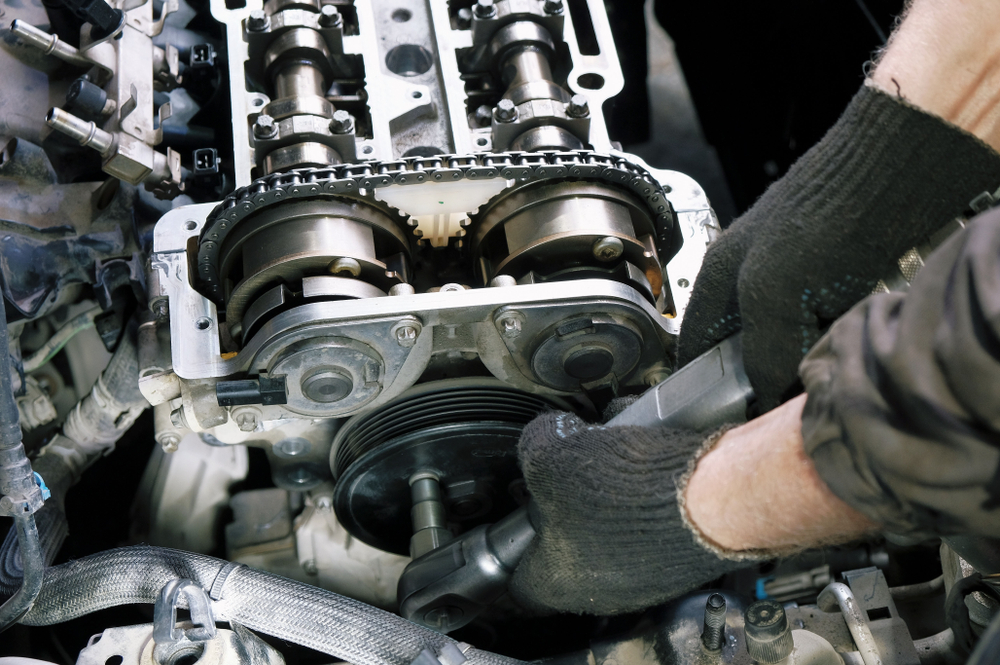When our auto repair shop specialists get an urgent call for help, it is usually something very serious. In most cases, a car suddenly stops in the middle of the road, and the driver has no idea why. However, after a discussion with the driver, we found out that they noticed something not quite right, but did not pay attention. In fact, they noticed bad timing chain symptoms in the tensioner or other parts of this critical component of the car.
The fact is that without the BMW timing chain working properly, your prized vehicle is not safe to drive. If it happens to fail while you are driving, you are in great danger. Your car will stop in the middle of oncoming traffic, and you risk getting hit before you can safely get out of the car and walk to the side of the road.
Since this is such a serious problem and it is still a big unknown to many car owners, this article will explain to you what you must know about timing chain failure symptoms before it gets broken completely.
What Is a Timing Chain on a Car?
But before we talk about timing chain problems, let us explain what exactly this component is. The timing chain is the engine part that coordinates the opening and closing of the valves inside a combustion engine. By syncing the camshaft and crankshaft to open and close these valves, the timing chain ensures that the engine pistons do not hit the valves.
Thus, when you have a bad timing chain, the crank no longer performs the syncing of the valve opening and closing. The entire combustion process stops, and the driver can no longer operate the car.

Types of Timing Chain
Now that you know the role of a timing chain, let us discuss the two types of chains used by car producers. For each type of chain, there are different timing chain failure causes resulting from the specific build of the component.
Link Chains
This type of timing chain is made of precision links made of flat hardened alloy steel. They are connected to each other by pressed pins. This is also known as a silent chain because its shape is designed for smooth operation. We mention this because if you happen to hear noises, then you definitely have timing chain issues.
Roller Chains
This type of chain looks very much like the one you find on a bicycle. But, of course, it is made much more durable and resilient. Cars with a smaller engine capacity have a single roller chain. More powerful engines require a double chain.
As we are speaking of timing chain symptoms, do not confuse it with a timing belt. While it serves the same purpose, it is a completely different component and has specific signs of failure.
How a Timing Chain Works
We now know how the device looks. But how does a timing chain work? It runs continuously on sprockets in a circle like a conveyor belt. Its movement is set with great precision to achieve the syncing of the opening and closing of the valves. This translates into a high level of wear and tear, and this is what causes a timing chain to break.
Before we discuss the signs of the bad timing chain, here’s how to be proactive about spotting a problem.
How to Check for a Bad Timing Chain?
Before you notice timing chain tensioner failure or experience a broken chain, here’s how to tell if the timing chain is bad:
- The check engine light is on
- You find metal shavings in the car oil
- The engine misfires repeatedly.
Symptoms of a Bad Timing Chain
Do you have a loose timing chain due to a stretch or a too-tight tensioner? There are several symptoms of a bad timing chain to look and listen for. Doing so will prevent getting stuck in the middle of the road with no possibility of moving your car out of the way of oncoming traffic. So, let us detail the most important loose timing chain symptoms and timing chain tensioner being too tight.
Stretched Timing Chain
The constant movement through guides and hubs leads to a bad timing chain that gets stretched too much. You will notice an increase in fuel consumption and reduced power at low speeds. You will also hear a rattling sound when you pop up the hood. The noise varies as you change speeds.
Worn Timing Chain Sprockets or Idlers/Tensioners
What does a bad timing chain sound like if you have this problem? You will experience the same symptoms as in the case of a stretched chain, plus a whirring sound that gets louder as you increase the car speed.
Do not ignore these bad timing chain tensioner symptoms, especially if a recall was issued for your BMW model.
Worn Chain Guides
In time, the timing chain guides will get damaged due to wear and tear. If this is the case, you will hear a clattering or rattling sound, especially when you are driving at low speeds.
Timing Chain that Jumped from Its Idler or Tensioner
The signs of a bad timing chain are unmistakable in this case. You will hear a loud grinding noise as the chain jumps, and then the engine will stop running.
Visually Broken Timing Chain
Just as in the situation presented above, the engine will stop running. However, a broken timing chain will also cause extensive damage to the engine.
Check Engine Light
Whenever the check engine light is on, there is a problem with the engine, and you must not ignore it. This light will also come on in case of a bad timing chain.
What Causes Timing Chain to Break?
All these bad timing chain symptoms make you wonder: why does this critical part break? Do timing chains need to be replaced? The answer to the second question is yes. To the first question, the possible causes are:
- Regular wear and tear
- Operating the car at maximum capacity (racing)
- Failure to change the oil and replace the filter as recommended
- The tensioner was set too tight during maintenance.
We Know How to Identify and Address Potential Timing Chain Issues
BW Performance is a team of specialists who are truly passionate about European cars. We know how to tell if the timing chain is bad and what to do about it. And we will offer you a fair BMW timing chain replacement cost, together with the guarantee of excellent workmanship.
As we explained in this article, there is no good answer to how long can you drive with a bad timing chain. You should not plan any other journey before our auto repair technicians look at your engine and fix or replace the timing chain. If the chain fails in the middle of a busy expressway, your life may be at risk.
If you suspect BMW timing chain problems, don’t wait any longer but bring your prized vehicle to us. We are here for all European car owners in:
- Thornton, CO,
- Arvada, CO
- Westminster, CO,
- Denver, CO.
Call us to schedule an appointment: 303-800-7193!
FAQ
- Can a car run with a bad timing chain?
If you are wondering how long will a stretched timing chain last, the answer is no time at all. At any moment the chain may break, the engine will stop, and you will be unable to operate the car
- How do you check for timing chain problems?
There are three major signs of a bad timing chain:
- Rattling or clattering noises coming from the engine
- The check engine light is on
- The engine repeatedly misfires.
- How long should a timing chain last?
On average, you should come to our auto repair shop for timing chain replacement after each 80,000 – 120,000 miles driven. However, you must bring your car for an inspection if you notice any of the symptoms of the bad timing chain described above. The cost to replace it on time is nothing compared to the risk of a car crash if it fails.
- What noise does a bad timing chain make?
One of the loose timing chain symptoms is a rattling noise. If you hear a clattering noise, then you should pull over as soon as possible because the chain is about to break or jump from the idler or tensioner.
 6425 Washington St. #18
Denver, CO 80229
6425 Washington St. #18
Denver, CO 80229
